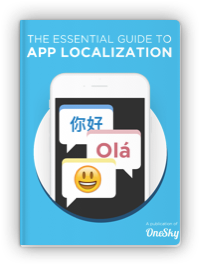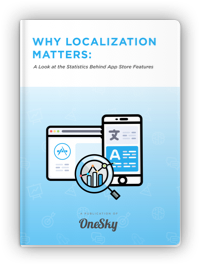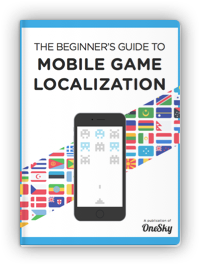Localization Automation with AI & Agentic AI: A Strategic Guide for Global Enterprises
In a global economy, speed and cultural relevance are crucial.
Manual localization processes—translating and reviewing content—are too slow and costly to keep up. That’s where localization automation with AI comes in.
Thanks to agentic AI, automation is going beyond simple translation.
It’s now capable of learning, adapting, and managing the entire content lifecycle—delivering personalized, culturally authentic content faster, at scale.
This new era of localization automation empowers brands to connect more meaningfully with audiences worldwide—quickly, accurately, and effortlessly.
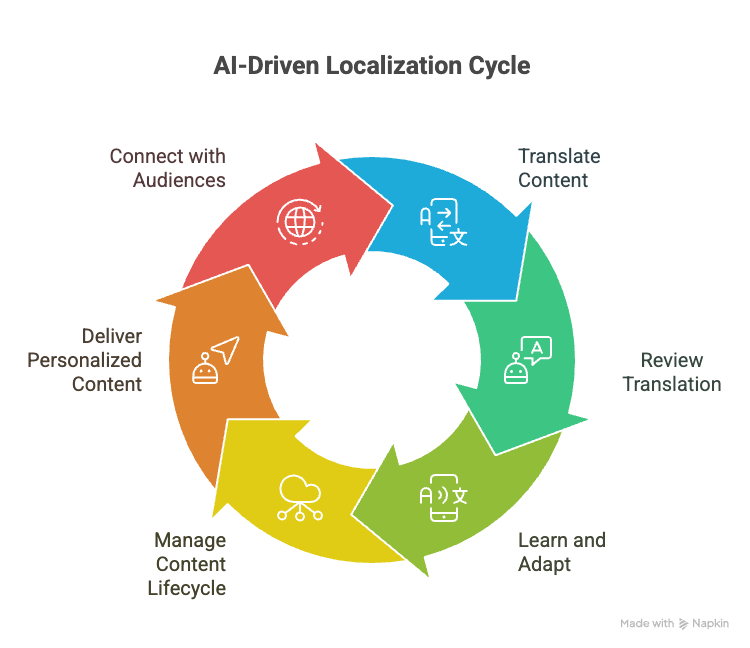
The Evolution of Localization Automation
Past Challenges with Manual Localization
Manual localization involved lots of human effort: translators, editors, legal reviewers, and cultural consultants working in sequence.
While this approach was accurate, it had major downsides:
- Slow process: Launches took weeks or months.
- High costs: Large teams and repeated revisions meant hefty expenses.
- Inconsistency: Different regions sometimes produced slightly different messages, risking brand dilution.
- Slow updates: Changes in laws or market trends could take days or weeks to implement.
- Limited agility: Reacting quickly to market shifts or social trends was nearly impossible.
Early Automation Solutions and Their Limits
To speed things up, companies used rule-based systems or basic Machine Translation (MT).
These brought some improvements but still fell short:
- Rigid and static: They couldn’t learn or adapt over time.
- Lacked nuance: Literal translations failed to capture idioms, humor, or cultural subtleties.
- High manual review needed: These systems still required human correction and oversight.
Although neural models (like neural MT) improved fluency, they still couldn’t deliver culturally authentic, dynamically updated content—until now.
Enter Agentic AI: The Next Step in Localization Automation
What Is Agentic AI?
Agentic AI takes automation further.
It’s an advanced form of artificial intelligence capable of perceiving data, making decisions, and acting independently.
Think of it as a digital autonomous agent—a tireless, self-improving team member that manages your content lifecycle.
Key Qualities of Agentic AI:
| Attribute | What It Means | How It Helps Your Business |
|---|---|---|
| Autonomy | The AI operates independently | Removes bottlenecks, speeds up updates |
| Learning | Gets smarter over time from actual data and feedback | Improves accuracy without manual re-training |
| Context-Awareness | Understands culture, sentiment, and language nuances | Produces content that truly connects with local audiences |
| Goal-Driven Action | Handles the full content cycle—from translation to updates | Ensures continuous, relevant content delivery |
In simple words, agentic AI doesn’t just translate — it performs content management, constantly learning and adjusting to local needs, trends, and regulations.
How It Differs from Old AI & Basic Automation
| Aspect | Traditional AI / Automation | Agentic AI |
|---|---|---|
| Reaction | Reacts to specific commands or rules | Proactively perceives, decides, and acts |
| Adaptability | Fixed workflows, limited flexibility | Learns, evolves, and adapts dynamically |
| Scope | Automates isolated tasks | Manages full content lifecycles end-to-end |
| Complexity Handling | Suitable for simple, routine tasks | Handles complex, changing environments |
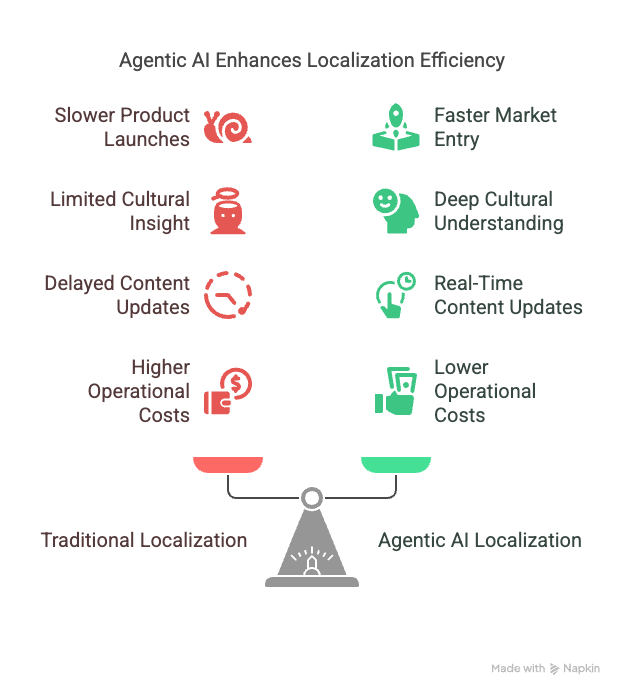
How AI & Agentic AI Power Localization Automation
1. Speed & Scale: Launch Products Faster, Reach More Markets
Agentic AI continuously monitors social conversations, regulatory updates, and customer feedback.
It then automatically updates your website, product info, or support content across multiple languages—without manual delays.
Impact:
- Launch new products in dozens of markets simultaneously, reducing time-to-market from weeks to hours.
- Respond quickly to market trends, seasonal events, or regulatory shifts
2. Deep Cultural & Sentiment Understanding: Authentic Local Engagement
Agentic AI doesn’t just translate words; it interprets idioms, humor, and cultural norms.
It analyzes social media conversations, reviews, and regional behaviors to craft messages that truly resonate.
Impact:
- Create content that feels naturally native to each market, fostering stronger emotional connections.
- Avoid cultural faux pas or misunderstandings that could harm your brand.
- Deliver tailored content, from slogans to visuals, that is meaningful and engaging.
3. Real-Time Content Updates: Stay Ahead of Market Dynamics
Markets are constantly changing—new regulations, viral trends, or social events can quickly shift the context.
Agentic AI multitudes to monitor these shifts and makes updates instantly.
Impact:
- Keep legal notices, product details, and marketing messages up-to-date.
- Capitalize on trending topics or spontaneous events for marketing campaigns.
- Maintain relevance and compliance without delays or manual rework.
4. Cost Efficiency and Operational Excellence
Automation reduces reliance on large translation teams and repetitive manual revisions.
Agentic AI automates the updating and refinement process, decreasing costs while increasing output quality.
Impact:
- Significant reduction in translation and localization expenses.
- Reallocate human resources to strategic or creative tasks.
- Establish brand consistency across all channels at a lower total cost.
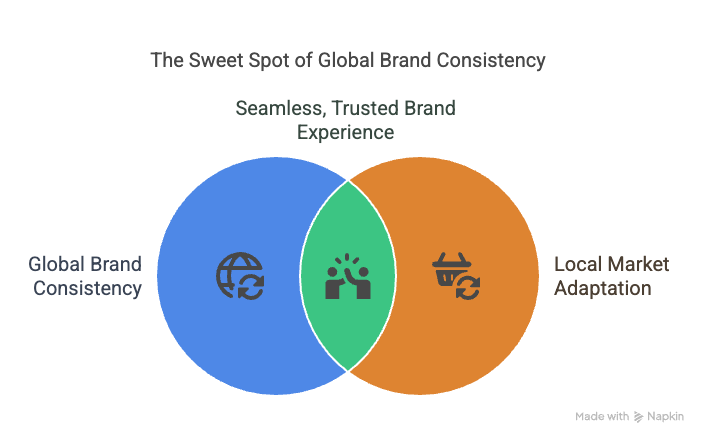
How do AI and Agentic AI Ensure Brand Consistency & Optimize Customer Experience?
Why Brand Consistency Matters
In a global marketplace, customers expect a seamless experience regardless of where they are.
Consistent messaging, tone, and visual style build trust and reinforce brand identity.
Yet, each market demands some local adaptation—this is a delicate balance.
How Agentic AI Supports Brand Consistency
- Unified Glossaries & Style Guides: AI systems are trained with consistent terminology, tone, and style to ensure brand standards are maintained worldwide.
- Automated Cross-Channel Sync: Updates made in one language or region cascade instantly across all channels—website, support content, marketing campaigns—preserving uniformity.
- Cultural Customization with Control: While adapting messages for relevance, AI systems follow predefined brand templates to prevent diluting core messaging.
Enriching Customer Experience
- Personalized Local Content:Deep understanding of regional preferences allows AI to tailor content, increasing relevance and engagement.
- Fast Response & Consistency: Autonomous systems update content instantly, ensuring customers receive accurate information without delays—critically enhancing satisfaction.
- Trust & Authenticity: When customers see their cultural norms reflected accurately, trust in your brand deepens, fostering loyalty.
Imagine a cultural blanket wrapped around your content:
AI ensures the blanket remains consistent in style and tone, but the pattern (content) adapts to each local fabric.
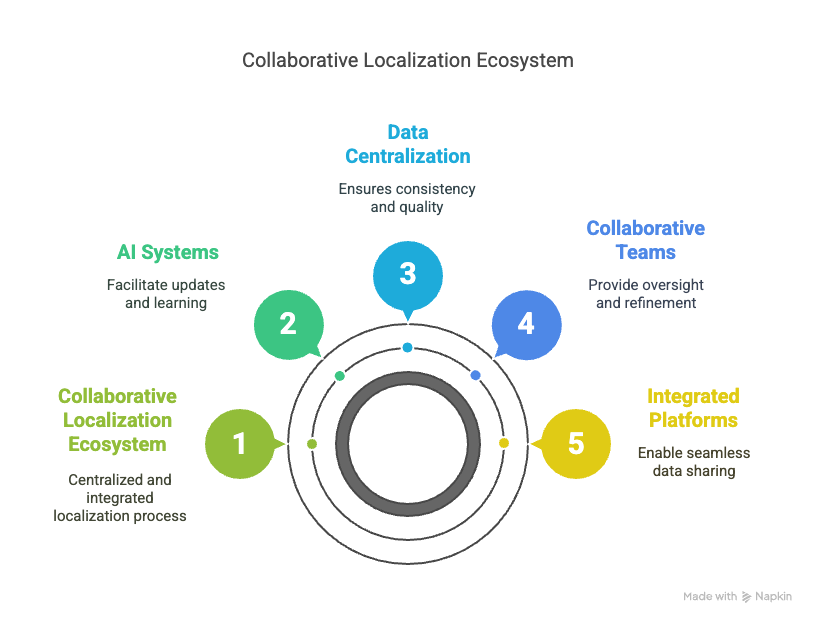
How to Build a Collaborative Localization Ecosystem?
Why a Unified Ecosystem Matters
Localization doesn’t happen in isolation—it’s part of a larger content management and business operation ecosystem.
To maximize benefits:
- Integrated Platforms:Combining AI localization, content management, customer support, and legal review systems enables seamless data sharing.
- Collaborative Teams: Linguists, cultural experts, legal officers, and marketers work hand-in-hand alongside AI systems for oversight and refinement.
- Data Centralization:A shared data foundation (glossaries, translation memories) supports consistent, high-quality localization.
Benefits of a Cross-Functional Approach
- Improved Accuracy & Consistency: When teams collaborate with AI-guided workflows, errors are minimized, and messaging stays on brand across markets.
- Faster Feedback & Improvement: Multidisciplinary teams can rapidly identify issues, providing feedback that AI systems learn from to evolve content quality.
- Enhanced Flexibility: Teams can adapt quickly to market shifts, legal changes, or consumer insights, with AI systems executing updates automatically.
Example Framework
- Content Team: Manages core messaging and branding standards
- Localization & Linguistics: Ensures linguistic and cultural accuracy
- Legal & Compliance: Validates regulatory adherence
- Customer Support: FeedbackLoop on content effectiveness
- AI systems: Orchestrate the entire cycle, facilitating real-time updates and learning
Big Picture:
Think of your localization ecosystem as an orchestra, where humans provide the melody—strategic guidance, cultural expertise, and oversight—while AI systems serve as the adaptive conductor.
The conductor ensures all instruments (teams and tools) work in harmony to produce synchronized, culturally resonant content at speed.
What This Means:
- Coordination & Integration: Success relies on aligning teams, data, and AI platforms for smooth interactions.
- Shared Goals & Data: Everyone operates from a single source of truth—glossaries, style guides, and compliance data—driving consistent, high-quality localization.
- Leveraging AI’s Strengths: AI handles the busywork—automatic updates, translations, compliance checks—while humans focus on nuance, branding, and strategic refinement.
An integrated, collaborative approach turns localization from a siloed task into a dynamic, strategic asset—delivering authentic experiences faster and more reliably than ever before.
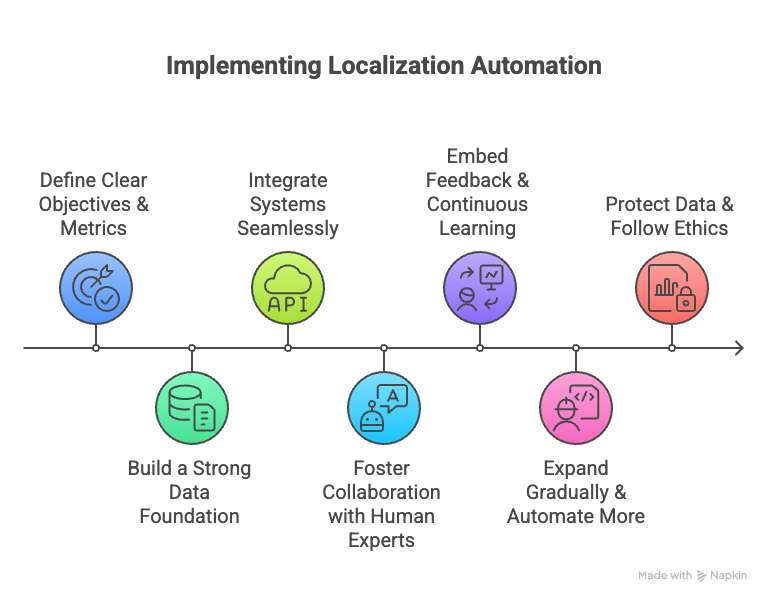
Turning Strategy into Action: How to Effectively Implement Localization Automation
Step 1: Define Clear Objectives & Metrics
Start with a clear idea of what success looks like.
Do you want faster product launches? Better cultural relevance? Lower costs? Set measurable goals.
Example KPIs:
- Reduce localization cycle times from weeks to hours.
- Improve translation accuracy or cultural fit score.
- Decrease overall localization costs by a set percentage.
Step 2: Build a Strong Data Foundation
AI learns from data.
Gather your translation memories, glossaries, cultural insights, and legal guidelines.
Clean and organize this data so systems can learn effectively.
Why it matters:
Good data means your AI makes fewer mistakes, produces more natural content, and better understands regional norms.
Step 3: Integrate Systems Seamlessly
Connect your AI tools to your existing content, CRM, legal, and support platforms.
Use APIs or connectors so data flows instantly and content updates happen automatically.
Why it matters:
No manual uploads. Your localized content updates in real-time, across all touchpoints.
Step 4. Foster Collaboration with Human Experts
AI handles the routine, but humans oversee for tone, cultural nuance, and legal accuracy.
Set review checkpoints where linguists and legal experts can verify and improve content.
Why it matters:
Blending AI speed with human authenticity ensures high-quality, culturally fitting localization.
Step 5: Embed Feedback & Continuous Learning
Track how localized content performs—customer reactions, engagement, compliance results. Use this data to retrain your AI models.
Why it matters:
Your AI gets smarter, more accurate, and more culturally relevant over time—creating a virtuous cycle of improvement.
Step 6: Expand Gradually & Automate More
Start with a pilot project—maybe a product line or specific region.
Test, learn, then expand step-by-step across more products, channels, or markets.
Why it matters:
Controlled growth reduces risk, ensures quality, and builds confidence.
Step 7: Protect Data & Follow Ethics
Use encryption, access controls, and privacy regulations (like GDPR).
Regularly audit outputs for bias or errors.
Why it matters:
Trust and compliance protect your brand and legal standing.
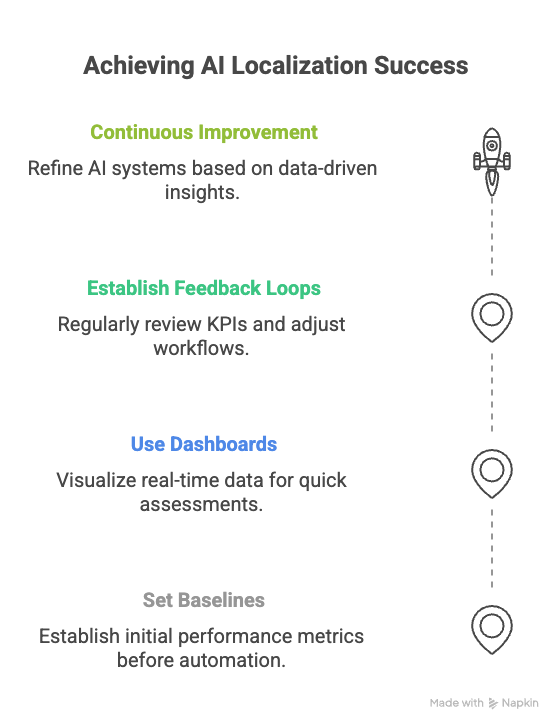
Measuring Success: Metrics & KPIs for AI-Driven Localization
Implementing AI-powered localization is a strategic investment, but how do organizations measure its success?
Establishing clear metrics helps track progress, identify areas for improvement, and demonstrate ROI.
Here are some key performance indicators (KPIs) and measurement practices:
Key Metrics to Track
| KPI | Description | Why It Matters | How to Measure |
|---|---|---|---|
| Time-to-Market Reduction | Speed of launching localized content | Faster launches mean better market capture | Compare cycle times before and after AI adoption |
| Translation Accuracy | Quality and correctness of AI translations | Ensures content quality and brand consistency | Use review scores, error rates, or human audit feedback |
| Cultural Relevance Score | Level of cultural appropriateness | Deep engagement depends on resonance | Conduct surveys or analyze social media sentiment |
| Customer Engagement | User interactions, conversions, feedback | Higher engagement indicates effective localization | Track website analytics, support inquiries, and social metrics |
| Legal & Compliance Accuracy | Correctness of localized legal content | Reduces legal risks and penalties | Regular audits and compliance checks |
How to Incorporate Metrics
- Set Baselines: Measure current performance before automation.
- Use Dashboards: Visualize real-time data for quick assessments.
- Establish Feedback Loops: Regularly review KPIs, adjust workflows, retrain AI models based on insights.
- Continuous Improvement: Use data-driven insights to refine AI systems, improve quality, and accelerate timelines.
Success in localization automation isn’t just about speed; it’s about delivering culturally authentic content without errors—enhanced through ongoing measurement and agile adjustments.
Think Ahead: Addressing Potential Challenges
| Challenge | How to Solve | Business Benefit |
|---|---|---|
| Data Privacy & Security | Encrypt data, controls, audits | Keep customer trust & meet regulations |
| Cultural Bias & Sensitivity | Regular checks, diverse data | Respectful, relatable content |
| Technical Complexity | Phased deployment, modular systems | Lower risk, smoother rollout |
| Human Resistance | Transparent communication, change management | Smoother adoption and internal alignment |
Key takeaway:
Robust governance, continuous monitoring, and transparency turn AI’s high potential into a reliable, ethical component of your localization strategy.
The Future of Localization Automation with AI & Agentic AI
Major Trends to Watch
| Trend | Explanation | Business Benefit |
|---|---|---|
| Hyper-Personalized Content | Tailor content for individual user preferences in each market using advanced AI analytics | Increased engagement, higher conversions, and stronger customer loyalty |
| Deep Cultural & Sentiment AI | AI systems interpret social cues, humor, and regional norms at a nuanced level, ensuring more authentic messaging | Reduced risk of cultural missteps, improved brand perception |
| Full Lifecycle Automation | AI manages the entire content localization process—from keyword detection to translation to deployment—without manual intervention | Faster time-to-market, lower costs, and more consistent messaging |
| Multi-Modal Localization | Incorporate images, videos, audio, and voice in localized content for richer, immersive experiences | Stronger emotional connection with audiences, higher engagement |
| Predictive & Preemptive Updates | AI anticipates market shifts or regulatory changes, updating content proactively | Competitive advantage in fast-paced markets |
Strategic takeaway:
Organizations that adopt these advanced AI-driven trends early will build resilient, adaptable content strategies—delivering personalized, relevant experiences faster than competitors and positioning as industry innovators.
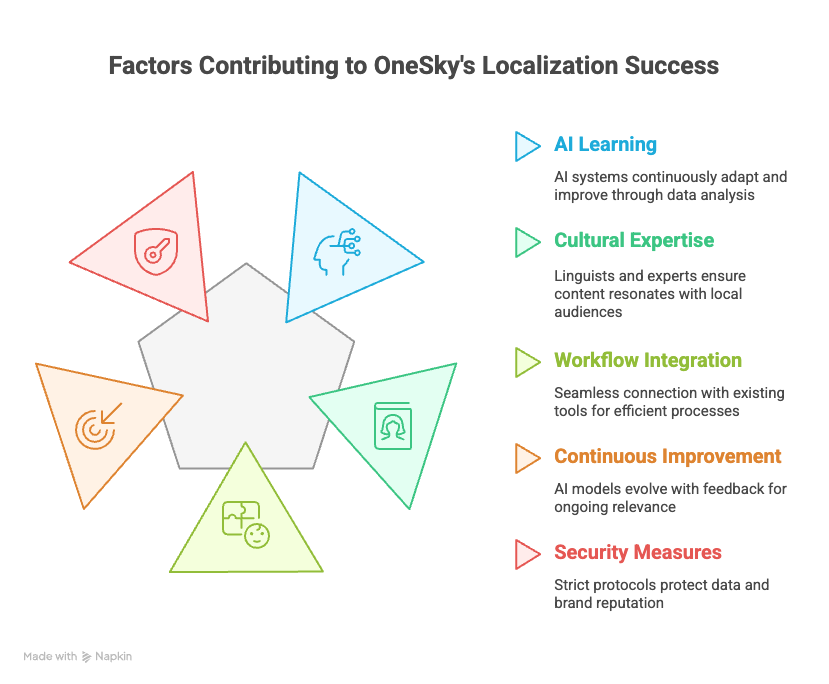
Why Partner with OneSky?
We help you unlock the full potential of automated, intelligent localization. Here’s what sets OneSky apart:
1. Cutting-Edge AI that Learns & Adapts
- Our automation system uses the latest agentic AI, which learns continuously from new data, feedback, and market trends.
- It orchestrates a team of specialized AI agents working behind the scenes—automating translation, cultural adaptation, and content updates without manual effort.
- This means you get faster, more consistent, and high-quality localized content at scale.
2. Deep Cultural Understanding for Authentic Localization
- Our linguists and cultural experts work hand-in-hand with AI to ensure your content feels genuinely local.
- We customize messaging, visuals, and tone so they resonate naturally with each target audience—avoiding missteps and building trust.
- Together, AI and human insights deliver content that truly connects.
3. Easy Integration Into Your Existing Workflow
- You don’t need to overhaul your systems. Our platform smoothly connects with your current content management, legal, and support tools.
- Content changes, product launches, or compliance updates trigger automatic localization workflows—saving you time and reducing errors.
- You stay in control, while AI handles the heavy lifting.
4. Continuous Learning for Better Results
- Our AI models don’t just stay static—they learn and improve from real-world feedback, customer interactions, and market shifts.
- This means your content stays relevant, accurate, and culturally correct over time—without manual rework.
- You get a smart, evolving localization process that keeps you ahead.
5. Reliable & Secure
- We follow strict privacy and data protection laws like GDPR and CCPA.
- Your customer data and localization workflows are protected with top-tier security measures.
- Trust and compliance are core to our approach—safeguarding your brand and reputation.
Why It Matters?
Partnering with OneSky enables you to implement localization automation powered by AI & agentic AI— giving you fast, scalable, culturally authentic content without sacrificing quality.
This means you can respond faster to market demands, reduce costs, and build stronger relationships across all your global markets—effortlessly.
Cost-Benefit Analysis: ROI of AI & Agentic Localization
Understanding the real value of implementing AI-powered localization is critical to gaining executive buy-in.
Here’s a simplified framework to evaluate ROI:
Key Components
| Benefit | How It Adds Up | Example Savings or Gains |
|---|---|---|
| Faster Time-to-Market | Automate manual workflows, reduce cycle times | Launch products weeks faster, capturing market share early |
| Cost Savings | Lower translation and review costs, rework reduction | 30-50% decrease in localization expenses |
| Quality & Consistency | Reduced errors, cultural misalignments | Fewer legal issues, repeatable high-quality messaging |
| Market Responsiveness | Dynamic updates, trend responding | Capitalize on viral events or legal changes instantly |
| Customer Engagement | More relevant content boosts loyalty | Higher retention, upsell conversions, brand trust |
ROI Calculation Example
Suppose your current localization costs amount to $1 million annually, with an average cycle time of 6 weeks.
Post-automation, you expect:
- 50% cost reduction to $500,000
- Content updates happening in 1 week instead of 6
- Improved engagement leading to increased revenue
Result:
The ROI isn’t just in saved costs—it’s in faster revenue cycles, stronger brand equity, and nimbleness in competitive markets.
Investing in agentic AI-powered localization isn’t a one-time expense—it’s a strategic enabler for speed, cost-efficiency, and market agility, delivering exponential value over traditional approaches.
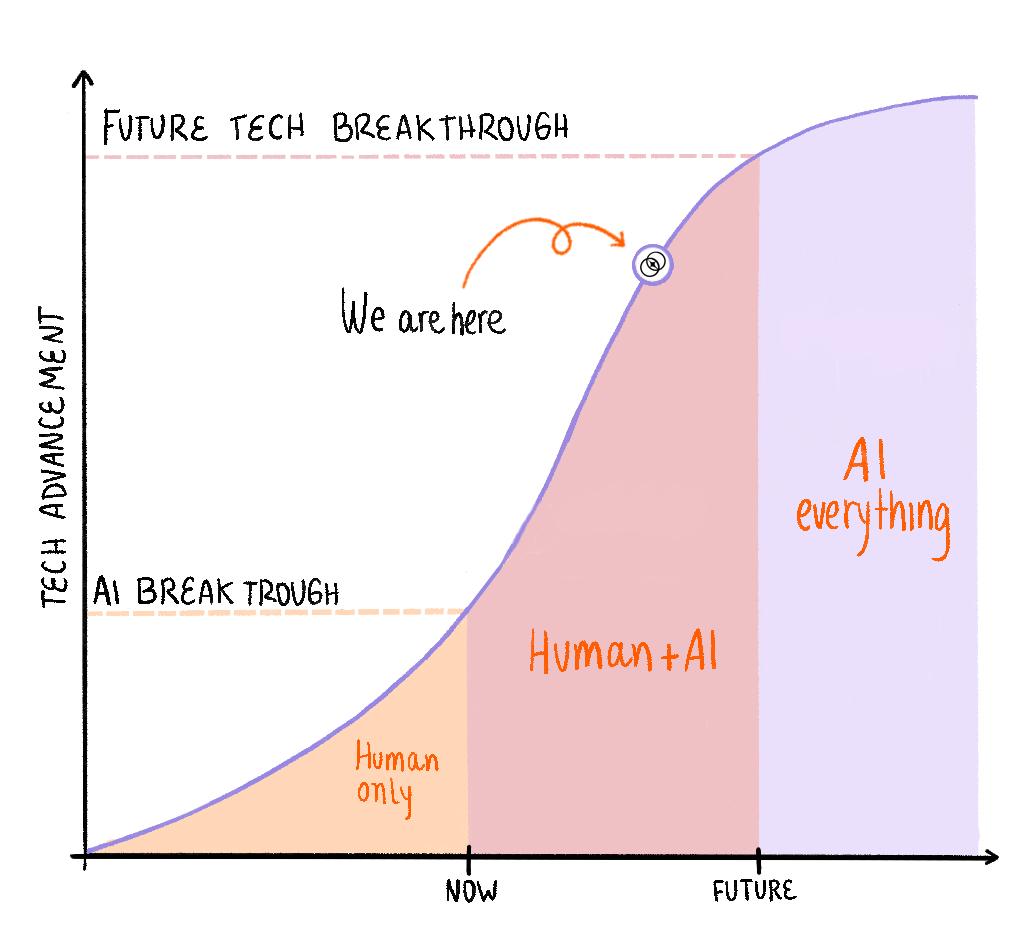
Final Thoughts: Leading the Future of Localization
The shift toward localization automation with AI & agentic AI is a game-changer—not just for cost savings but for strategic agility and cultural authenticity.
Fully autonomous systems allow your enterprise to:
- Launch faster in new markets, gaining first-mover advantages
- Maintain relevance with real-time, culturally adapted content
- Reduce costs and optimize resource allocation
- Respond instantly to social trends, regulations, and customer feedback
- Build stronger global relationships through authentic engagement
The question is no longer if AI will transform localization—it’s whether your organization will lead or follow.
Partnering with a proven expert like OneSky empowers you to harness this new frontier, turning autonomous localization into a strategic advantage.
Ready to transform your global content strategy?
Contact OneSky today for a tailored consultation.
Discover how localization automation with AI & agentic AI can accelerate your international growth, deepen cultural connections, and improve your bottom line.
The future of intelligent, autonomous localization starts now.
Frequently Asked Questions (FAQs)
Q1: What is localization automation powered by AI & agentic AI?
A: It’s the use of autonomous AI systems that learn, adapt, and manage the entire content localization process—translating, customizing, and updating content automatically across markets.
Q2: How does agentic AI improve localization compared to traditional methods?
A: It continuously learns from real-world data, allowing for faster updates, deeper cultural relevance, and more consistent content—reducing manual effort and errors.
Q3: Can this technology really handle complex, multi-language projects?
A: Absolutely. Agentic AI orchestrates multiple specialized agents to deliver high-quality results at scale, managing the entire workflow from translation to deployment.
Q4: Is this system secure and compliant with data regulations?
A: Yes. We follow strict privacy laws like GDPR and CCPA, ensuring your data—and your customers’—are protected.
Q5: Do I need to replace my current tools to use AI-powered localization?
A: Not at all. Our platform integrates smoothly with your existing systems, making automation seamless without disrupting your current workflows.
Q6: How does ongoing learning benefit my localization strategy?
A: The system improves over time by learning from feedback and market shifts, ensuring your content stays relevant, accurate, and culturally appropriate.
Q7: What’s the main benefit of using AI & agentic AI for localization?
A: Faster, scalable, and culturally authentic content delivery—helping you respond to market demands quickly while maintaining quality.
Q8: How quickly can I see results after implementing AI-powered localization?
A: You can start automating content updates immediately, with rapid improvements in speed, consistency, and scalability, often reducing localization cycles from weeks to hours.
Q9: Can AI handle legal and compliance content across different regions?
A: Yes. The system automatically updates legal notices, disclaimers, and regulatory content, ensuring your global communications stay compliant without manual rework.
Q10: What kind of support or updates does OneSky provide?
A: We continuously optimize our AI models, ensure integration compatibility, and offer dedicated support to help your team adapt and maximize the benefits of localization automation.

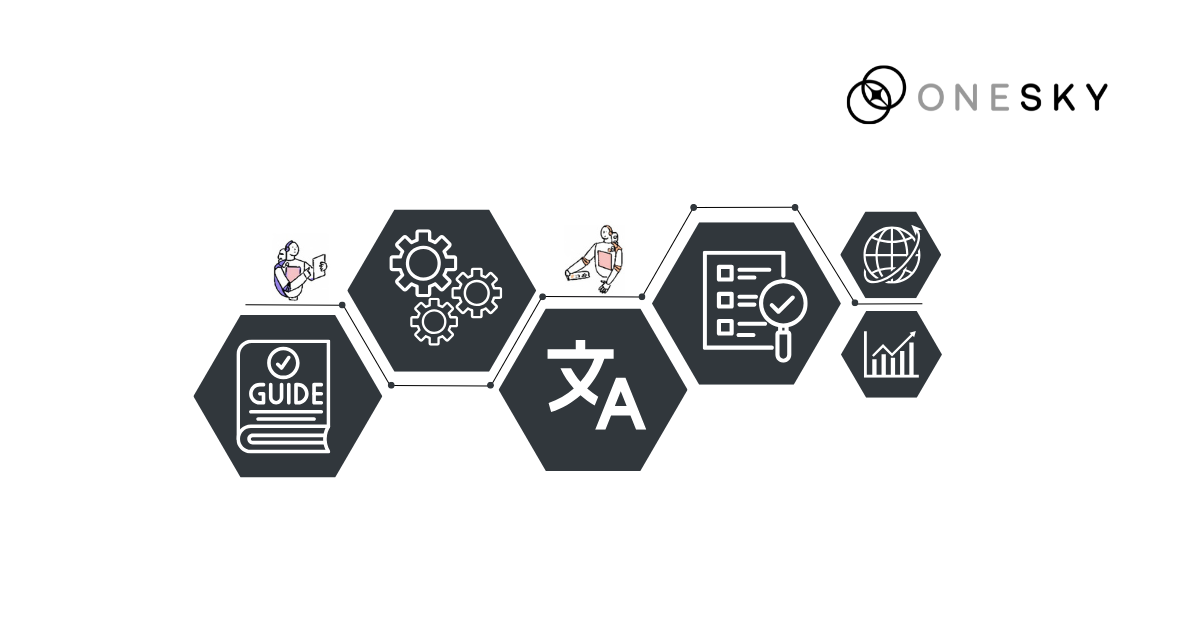
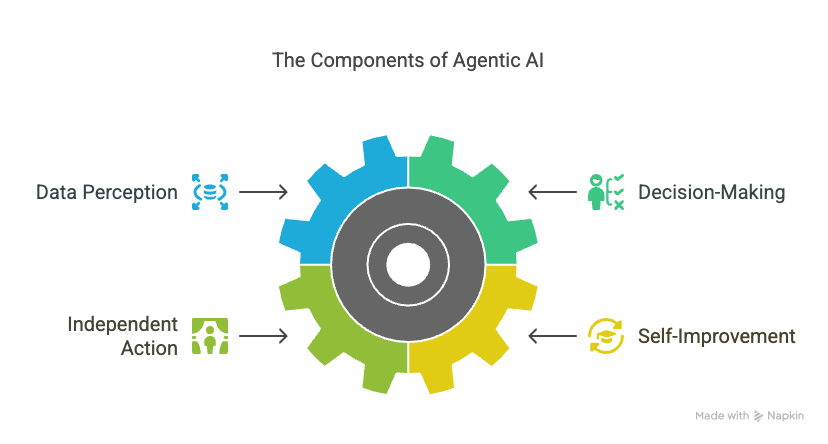

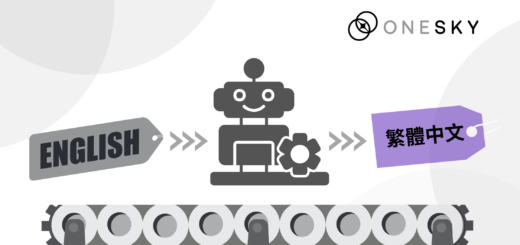
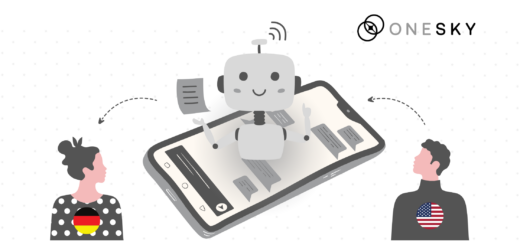
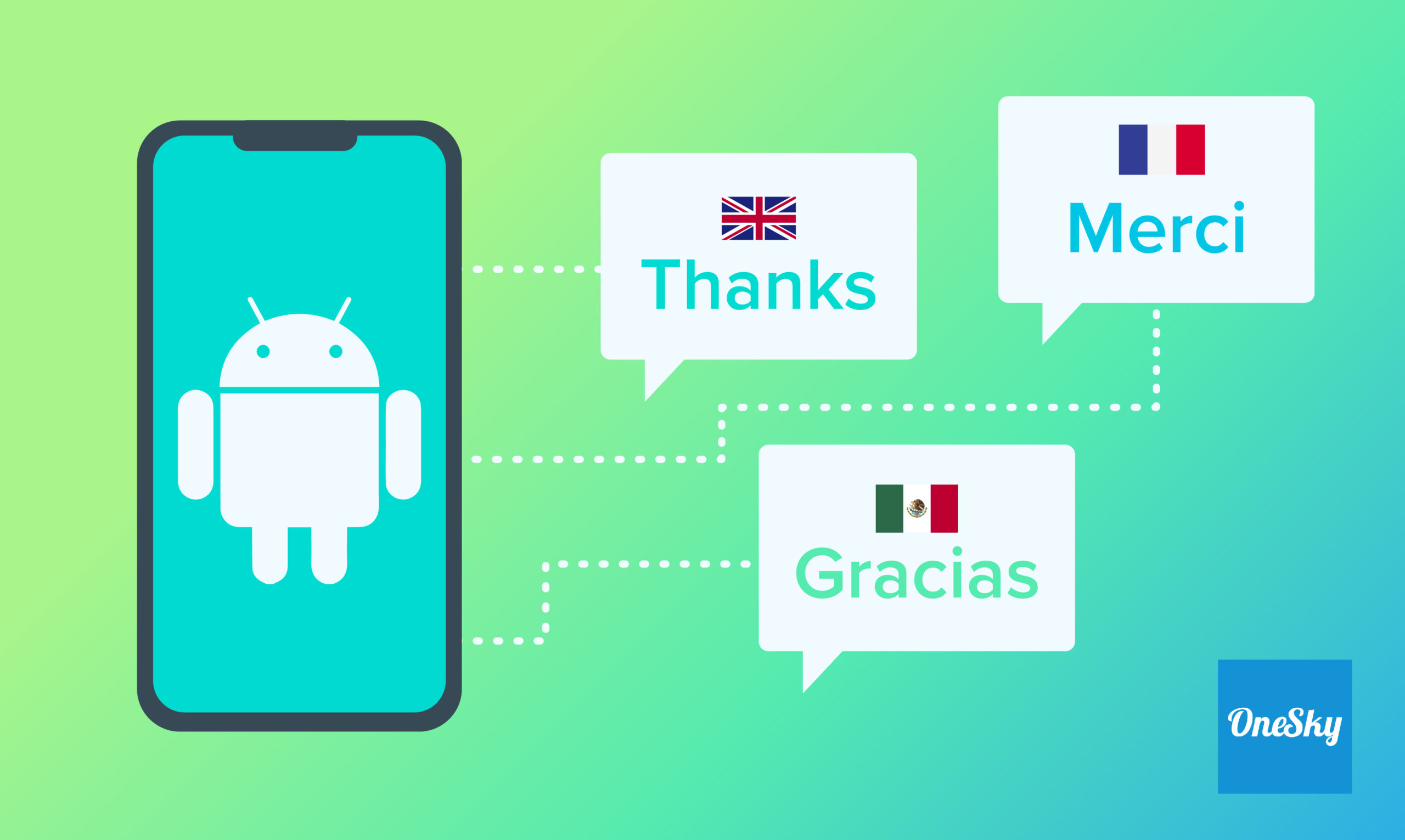
 Written by
Written by 

 Written by
Written by 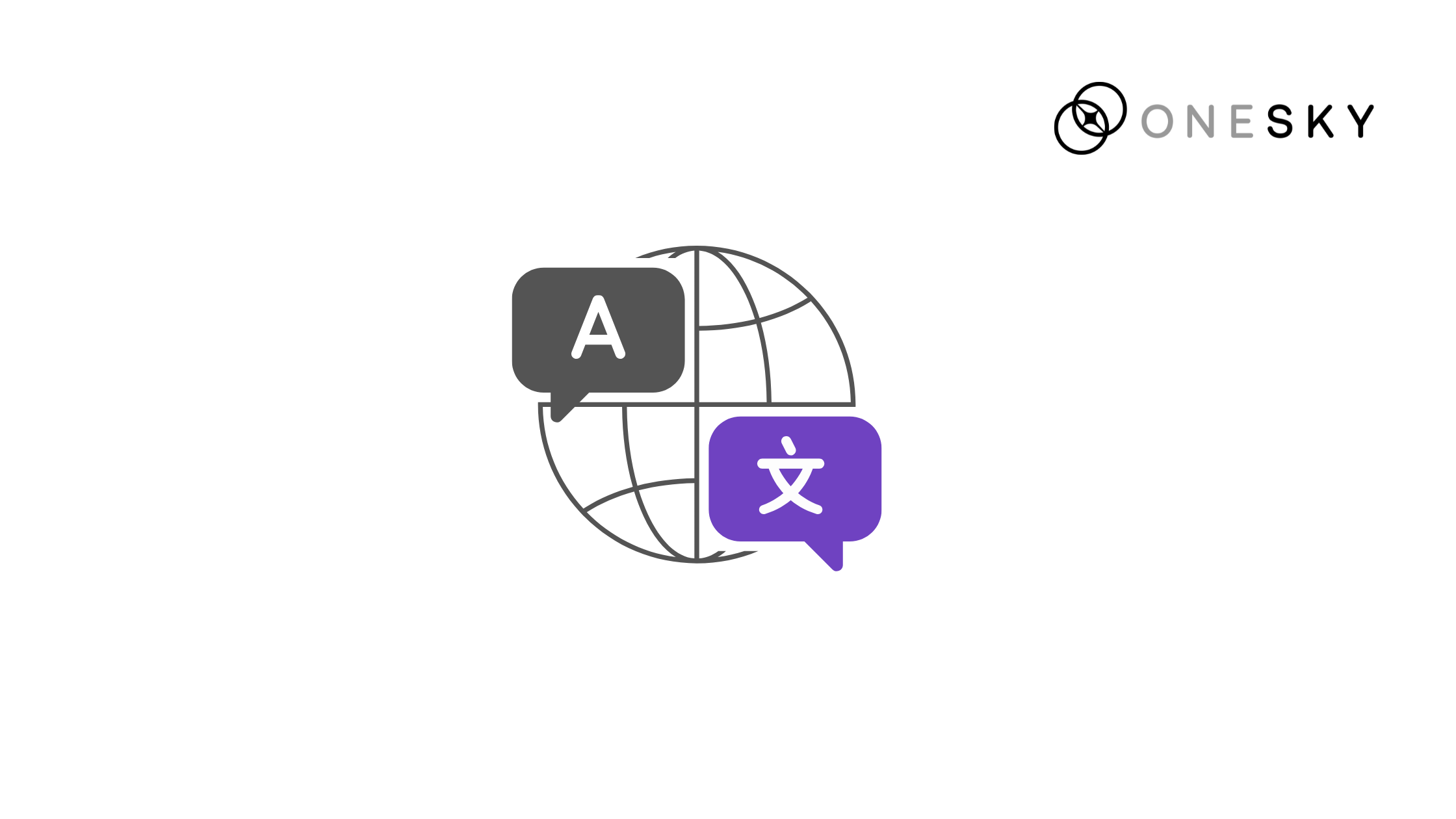
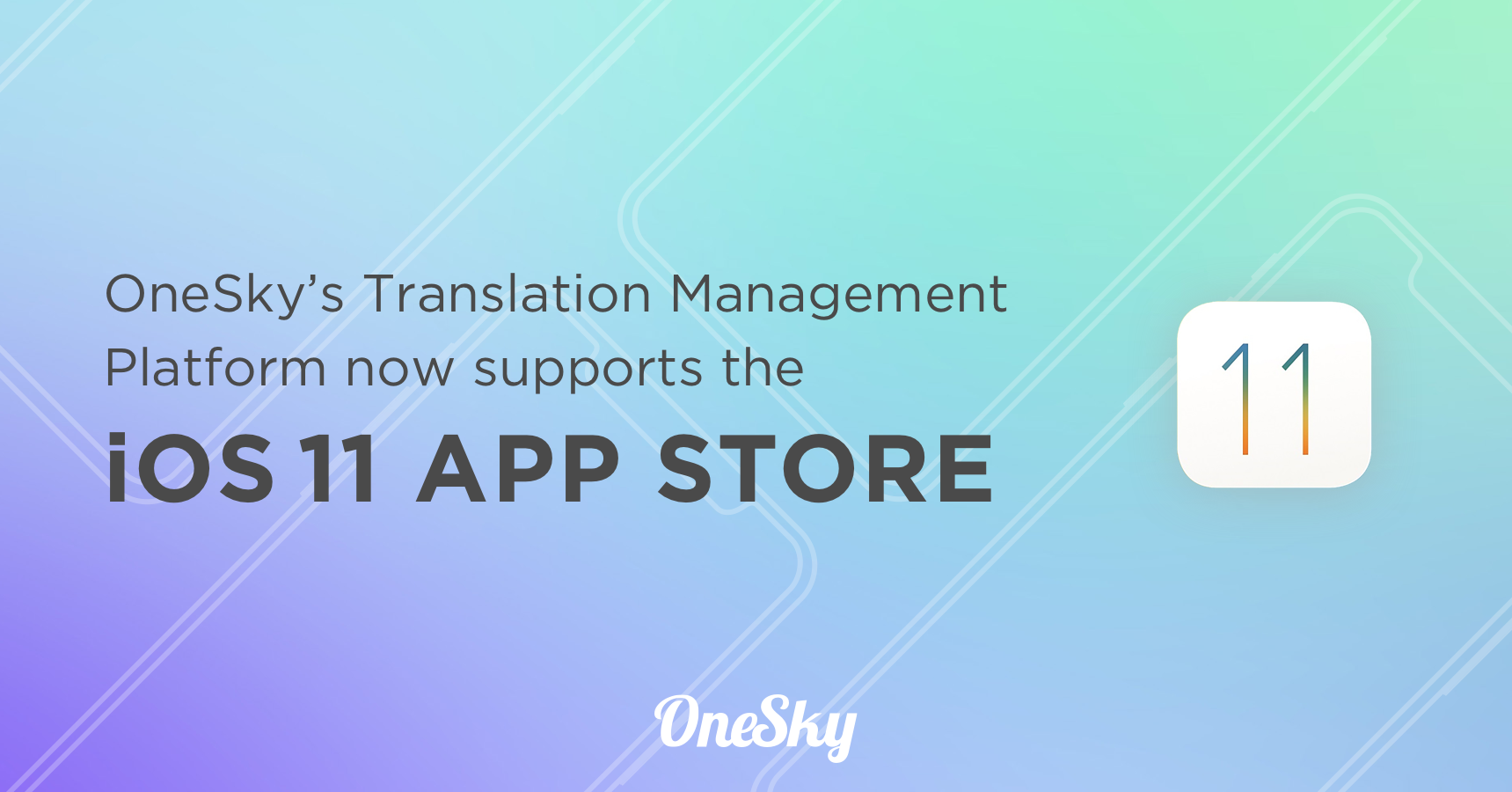
 Written by
Written by 
